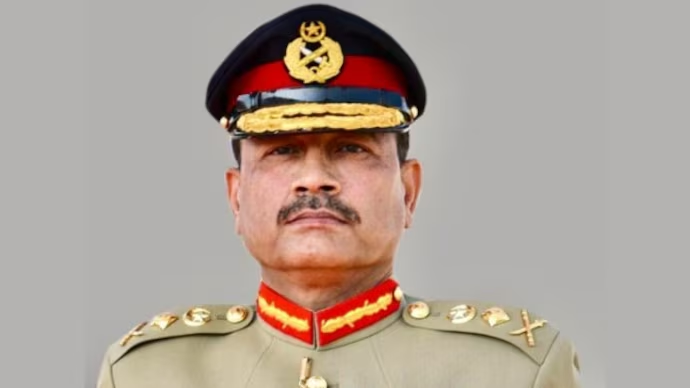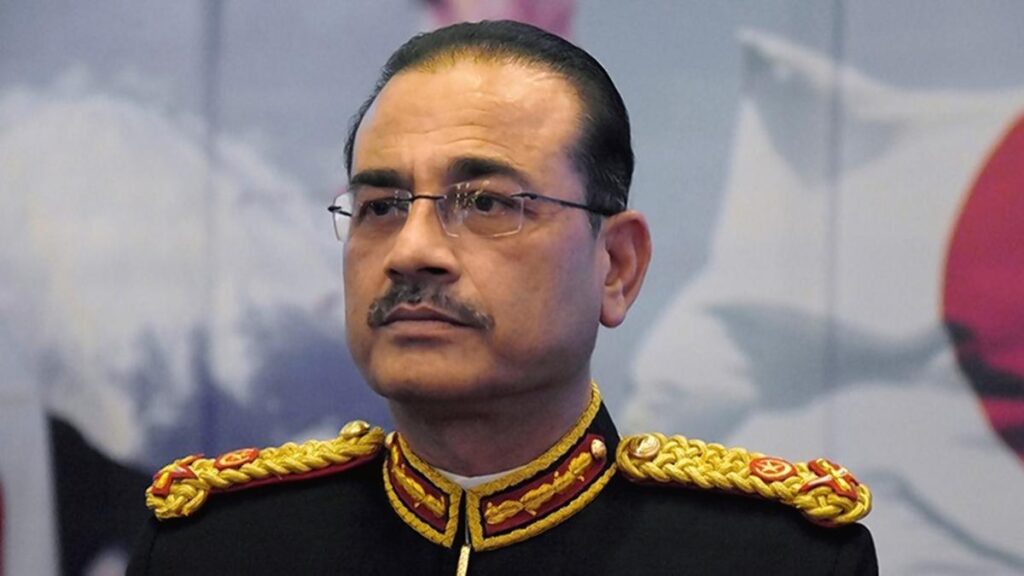
In a stunning development that has sent ripples through diplomatic circles, a recent interaction between Pakistan’s Chief of Army Staff (COAS), General Asim Munir, and a US-designated terrorist has drawn sharp criticism. This incident, flagged by Indian politician Asaduddin Owaisi, highlights a significant and concerning narrative about Pakistan’s alleged ties to terrorism.
The encounter reportedly took place during a high-profile event in Riyadh, Saudi Arabia. The handshake between General Munir and the individual in question has raised eyebrows globally, reigniting debates over Pakistan’s commitment to counterterrorism and its international obligations. This incident, if true, has the potential to strain Pakistan’s relationships with key allies and partners, particularly those deeply invested in the global fight against terrorism.
A Diplomatic Quagmire Unfolds
General Asim Munir, who has served as Pakistan’s Chief of Army Staff since November 2022, is no stranger to international diplomacy. However, this controversial interaction risks overshadowing his efforts to position Pakistan as a responsible global player. The handshake—which has yet to be officially confirmed or denied—was flagged by Asaduddin Owaisi, the president of the All India Majlis-e-Ittehad-ul-Muslimeen (AIMIM).
Owaisi’s statements have sparked fierce debates in political and diplomatic circles. Known for his vocal criticism of Pakistan’s policies, Owaisi alleged that the handshake is emblematic of a deeper, systemic issue within Pakistan’s governance and military structures. “It’s a clear indicator of Pakistan’s tacit support for terrorist entities,” Owaisi remarked during a press conference. “This is not an isolated incident but a reflection of Pakistan’s longstanding approach to harboring and nurturing terrorism.”
The Context of Riyadh: An Unlikely Backdrop
The setting for this alleged encounter adds another layer of intrigue. Riyadh, the capital of Saudi Arabia, has increasingly become a focal point for international diplomacy. As a nation that has invested significantly in counterterrorism efforts, Saudi Arabia’s hosting of such an event raises questions about the vetting processes and the implications of such interactions on its diplomatic standing.
Saudi Arabia has consistently positioned itself as a key player in combating terrorism, aligning with Western allies and regional partners to dismantle terror networks. This incident, therefore, puts Riyadh in a precarious position, potentially undermining its credibility as a counterterrorism ally.
This incident also highlights the challenges faced by host nations in managing the dynamics of high-profile events. From ensuring the credibility of attendees to safeguarding their own reputation, Saudi Arabia finds itself at the center of a diplomatic conundrum. The fallout could redefine its role as a global mediator and its ability to balance alliances with conflicting interests.
Pakistan’s Troubled History with Terrorism
Pakistan’s history with terrorism is a well-documented and contentious issue. Over the years, the nation has faced accusations of being a breeding ground for extremist ideologies and terror groups. Despite its claims of being a victim of terrorism, Pakistan has struggled to shake off the perception that it harbors and supports militant organizations for strategic gains.
For decades, international watchdogs and intelligence agencies have pointed fingers at Pakistan for its alleged double game. On one hand, it portrays itself as an ally in the war against terrorism; on the other, it is accused of providing safe havens to militant groups like Lashkar-e-Taiba, Jaish-e-Mohammed, and the Haqqani Network. These accusations have led to economic sanctions, diplomatic isolation, and a tarnished global reputation.
The timing of this incident could not have been worse for Pakistan. The country is grappling with severe economic challenges, political instability, and a precarious security situation. The added pressure of international scrutiny only exacerbates its struggles, making it imperative for Islamabad to address the allegations swiftly and decisively.
Reactions from the International Community
The international community has been swift to react to the allegations. While official statements from major global players are yet to emerge, the narrative has already gained traction in media outlets worldwide. Western nations, particularly the United States, have expressed concerns over Pakistan’s counterterrorism commitments in the past, and this incident is likely to exacerbate those doubts.
India, on the other hand, has seized the opportunity to highlight its longstanding accusations against Pakistan. New Delhi has consistently accused its neighbor of sponsoring cross-border terrorism and undermining regional stability. This incident provides further ammunition to India’s claims, bolstering its position in diplomatic engagements.
The reaction from Western nations is also critical. The United States, in particular, has long viewed Pakistan with skepticism when it comes to its counterterrorism commitments. The incident will likely reignite debates in Washington about the extent to which Pakistan can be trusted as an ally.
The Role of Media and Public Perception
Media coverage of this incident has been extensive, with various outlets dissecting the implications of the alleged handshake. Public perception, particularly in Pakistan, has been divided. While some view this as a baseless accusation aimed at tarnishing Pakistan’s image, others see it as a wake-up call for the nation to address its internal issues.
International media, however, has largely focused on the broader implications of the incident. The narrative of Pakistan’s alleged ties to terrorism has gained renewed attention, overshadowing any efforts by Islamabad to present itself as a victim of global geopolitics.
The role of social media in amplifying the issue cannot be overlooked. Platforms like Twitter and Facebook have become battlegrounds for narratives, with users from various countries sharing their opinions and interpretations of the incident. The rapid dissemination of information, coupled with the influence of opinion leaders, has further entrenched the story in public consciousness.
What’s Next for Pakistan?
This incident has placed Pakistan at a crossroads. The nation’s leadership, particularly General Asim Munir, must take decisive steps to address the fallout. This includes issuing a clear and transparent statement about the nature of the interaction and the broader implications of such allegations.
Moreover, Pakistan needs to double down on its counterterrorism efforts to rebuild its credibility on the global stage. This will require not just military actions but also robust diplomatic engagements to reassure allies and partners of its commitment to fighting terrorism.
One potential avenue for Pakistan is to enhance its cooperation with international organizations such as the Financial Action Task Force (FATF) and the United Nations. By actively participating in global counterterrorism initiatives, Pakistan can demonstrate its willingness to address concerns and align with international norms.
Saudi Arabia’s Stake in the Fallout
As the host nation of the event, Saudi Arabia also has much to lose. The kingdom’s leadership must navigate this diplomatic minefield carefully, balancing its relationships with Pakistan and other international stakeholders. Riyadh’s response to the incident will be closely watched, particularly by Western allies who have vested interests in the region’s stability.
Saudi Arabia could use this opportunity to reiterate its commitment to counterterrorism, potentially distancing itself from the controversy. This could involve a thorough investigation into the event and a reaffirmation of its stance against terrorism in all forms.
The Kingdom’s ability to mitigate the fallout will depend on its diplomatic agility and the measures it takes to reassure the global community. Hosting high-profile events comes with risks, and this incident underscores the importance of stringent vetting processes and proactive damage control strategies.
The Broader Implications for Global Counterterrorism
This incident serves as a stark reminder of the complexities involved in global counterterrorism efforts. It underscores the need for greater accountability and transparency among nations, particularly those accused of harboring or supporting terrorist entities.
The international community must leverage this moment to push for stronger mechanisms to address terrorism at its roots. This includes enhancing intelligence sharing, fostering regional cooperation, and holding nations accountable for their actions or inactions.
The broader implications of this incident extend beyond Pakistan and Saudi Arabia. It raises questions about the efficacy of current global counterterrorism frameworks and the role of state actors in perpetuating or combating extremist ideologies. This is an opportunity for international stakeholders to reassess their strategies and priorities in addressing terrorism.
Conclusion: A Test of Leadership and Credibility
The alleged handshake between General Asim Munir and a US-designated terrorist is more than just a diplomatic faux pas. It is a litmus test for Pakistan’s leadership and its commitment to combating terrorism. The fallout from this incident will not only shape Pakistan’s international standing but also influence the broader narrative of global counterterrorism efforts.
As the world watches closely, the onus is on Pakistan and Saudi Arabia to address the allegations head-on. Their responses will determine whether this incident becomes a footnote in history or a turning point in the fight against terrorism.
This incident could mark a watershed moment in global counterterrorism discourse. The lessons learned from this controversy could pave the way for more robust international collaborations, stronger regulatory frameworks, and a renewed commitment to eradicating the scourge of terrorism from the world stage.

